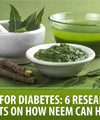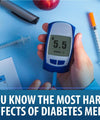Top 15 Factors to control Premature Aging
Recent Post
Weight gain without overeating: is
Feb 15, 2023
Neem For Diabetes: 6 Researched
Nov 03, 2022
Do you know the most
Nov 02, 2022
Start Eating These 7 Fruits
Oct 28, 2022

prakash singh
Wellness Strategist
Nov 02, 2023
Premature aging or looking old at early ages has become so common. Premature Hair loss, unhealthy skin, bloated belly, chronic diseases and of course your lack of charm makes you look older.
You are not alone, look around. In today's fast-paced world, it's no surprise that premature aging has become increasingly common. The signs of aging often manifest earlier than expected, leaving us to wonder what's causing this phenomenon.
Here let us explore the various factors contributing to the rising trend of premature aging, providing insight into why so many individuals are experiencing it.
1. Chronic Stress
Chronic stress is a leading factor in premature aging. High levels of stress trigger the release of hormones like cortisol, which can break down collagen and elastin, key components of youthful skin. Additionally, stress often leads to unhealthy coping mechanisms like smoking, excessive alcohol consumption, or poor dietary choices, all of which accelerate the aging process
2. Poor Dietary Habits
The modern diet, fast foods, characterized by high sugar, processed foods, and low nutrient content, plays a substantial role in premature aging. These foods promote inflammation, oxidative stress, and damage to cellular structures. A diet lacking in essential vitamins, antioxidants, and omega-3 fatty acids can accelerate skin aging, making wrinkles and fine lines more pronounced.
3. Excessive Sun Exposure
Overexposure to UV radiation is a well-established contributor to premature aging. Harmful UV rays can lead to wrinkles, age spots, and a loss of skin elasticity. The thinning of the ozone layer and a general increase in outdoor activities contribute to heightened exposure, often without adequate sun protection.
4. Inadequate Sleep
A consistent lack of sleep can have a profound impact on aging. During deep sleep, the body repairs and regenerates tissues, including the skin. Insufficient sleep impairs these processes, leading to premature aging signs like dark circles, puffiness, and dull skin.
5. Air Pollution
Urban living exposes individuals to high levels of air pollution, including fine particulate matter and toxins. Air pollution generates free radicals, which damage the skin and accelerate aging. Moreover, these pollutants can lead to skin conditions such as acne and exacerbate existing skin issues
6. Sedentary Lifestyle
A sedentary lifestyle has become increasingly prevalent, primarily due to desk jobs, screen time, and a lack of physical activity. Regular exercise promotes blood circulation and delivers essential nutrients to the skin. A lack of exercise can lead to reduced skin elasticity and a dull complexion.
7. Inadequate Hydration
Dehydration is a significant factor in premature aging. It can cause skin to appear dry and wrinkled. Additionally, inadequate water intake impairs the body's ability to flush out toxins, further accelerating the aging process.
8. Smoking and Alcohol Abuse
Smoking and excessive alcohol consumption wreak havoc on the body. Smoking narrows blood vessels, decreasing blood flow to the skin and leading to a loss of elasticity. Alcohol can dehydrate the body and impair its ability to absorb essential nutrients, further contributing to premature aging.
9. Lack of Sun Protection
Many individuals fail to protect their skin from the sun's harmful UV rays. Neglecting sunscreen or protective clothing can lead to premature aging signs, such as sunspots, hyperpigmentation, and uneven skin texture.
10. Harmful chemicals in Skincare Products
The beauty industry often utilizes harsh chemicals and additives that can irritate the skin, causing inflammation and redness. Regular use of such products can accelerate the aging process, contrary to their intended purpose.
11. Genetics
Genetics also play a role in premature aging. Some individuals are genetically predisposed to age faster due to factors like collagen production, skin type, and how their body reacts to environmental stressors.
12. Poor Sleep Quality
Even if you're getting enough sleep, poor sleep quality can affect aging. Frequent disruptions during sleep phases, such as sleep apnea, can lead to premature aging symptoms.
13. Lack of healthy diet
Taking outside food too often has its own reason. Over salted, preservatives, over oily foods at one side harm skin on the other side we almost forgot taking 3 portions of healthy vegetables and fruits. These habits accelerate aging. Early onset of wrinkles and other signs of aging are result of unhealthy food.
14. Psychological Factors
Mental well-being plays a role in aging. Age is not only how you look, it is how cheerful you are and how pleasant your presence is. Moreover, conditions like depression and anxiety can lead to unhealthy habits and lifestyle choices that contribute to premature aging
15. Environmental Toxins
Exposure to environmental toxins, including pesticides, heavy metals, and pollutants, can harm the skin and accelerate the aging process. Minimizing exposure to such toxins is essential.
Premature aging or looking older than you are - is a multifaceted issue influenced by a combination of lifestyle, environmental, genetic, and psychological factors. Recognizing these factors is the first step in mitigating their impact on your health and appearance.
By adopting a healthy lifestyle, making a habit of taking antioxidants like berries, noni, spirulina to protect hair, skin and mental wellbeing is amazing way to beat premature aging. Protecting your skin from the sun, and using skincare products with caution, you can slow down the aging process and maintain a more youthful, radiant complexion.
Prioritizing self-care and making informed choices are the keys to combating the epidemic of premature aging.
© 2022, WellthyLife. All Rights Reserved.








